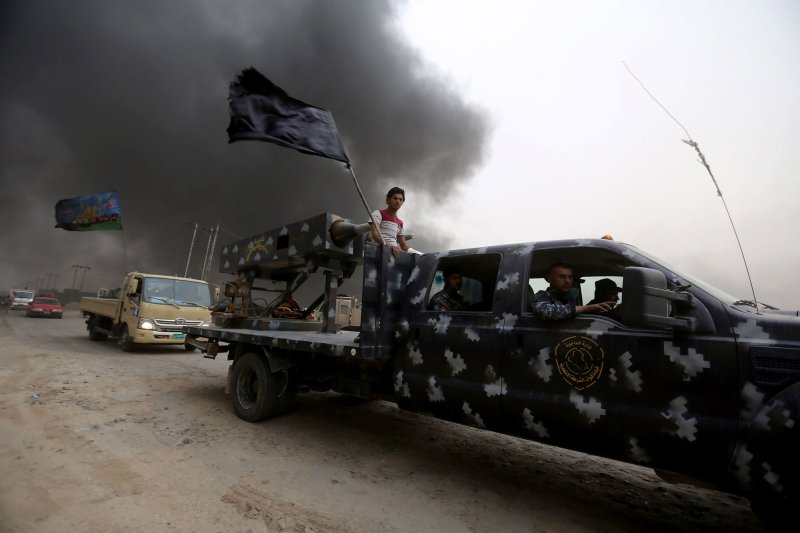Iraqi army fighters watch as smoke rises in the background from burning oil fields damaged during the fighting between Iraqi forces and Islamic State fighters in Qayara town south of Mosul, northern Iraq, on November 1. Photo by Murat Bay/UPI |
License Photo
Change is under way in Iraq where the Islamic State is losing ground in the battle for Mosul to the U.S.-backed coalition supporting government forces. That is the good news. The bad news is what comes next.
Various intelligence reports indicate IS has indoctrinated and trained about 4,000 people to carry out suicide attacks throughout the region and in Europe. It is a frightening thought when one considers the damage even a single such attacker can cause.
There is no concrete evidence to that report however; if there is any truth to it, probably a small percentage of the 4,000 would actually carry out attacks. It is hard to imagine an army of several thousand jihadists marching through Europe undetected but even if only 5 percent reach their intended targets, that is still 200 bombs.
Perhaps just as worrisome as the hundreds of suicide bombers roaming around Europe is the uncertainty of what is likely to replace the void created by the IS defeat.
It is hard to imagine something that does not exist. Imagining the future, be it in politics or other domains, requires much creativity. Who could have predicted the fall of communism and the rise of extremist religious fanatics? Indeed, when the Iron Curtain fell and many countries wasted little time in joining free market economic systems, radical Islamism rose to fill the socioeconomic-political void created by the absence of an ideology.
Political voids come with uncertainty. It cannot be known what will replace what has been pushed aside. Change can be for the better or it can create chaos and violence.
As recent history demonstrates, trends in the Middle East have followed a consistent path: Every period of violence in the Middle East wielded a crop of more radicalized and more violent groups.
What can we expect this time?
A rare message from IS leader Abu Bakr al-Baghdadi reveals the self-proclaimed caliph's preoccupation with defections from IS ranks with large numbers of militants abandoning the battlefield in the face of the assault on Mosul by Iraqi government forces and the U.S.-supported coalition.
Baghdadi, in his first audio address to followers in more than a year, called on his fighters to show discipline in battle. This "suggests that the group's leadership is increasingly concerned about defections," wrote Ludovico Carlino, senior analyst at IHS Country Risk.
Carlino reported morale among IS troops in Mosul is very low. The troops are reluctantly forced to fight by a hard core of more ideologically committed fighters. Ironically, senior leaders of the IS have been leaving Mosul for Raqqa for some time.
As IS fighters retreat from the battlefield, they are expected to punish Western countries that participated in their forced exit from Iraq. To that effect, U.S. intelligence sources alerted security officials in New York, Texas and Virginia. No specific targets were mentioned but the FBI warned those states to be extra vigilant.
What is far more worrisome than a crop of passing suicide bombers is what will fill the political void left by departing IS.
Just as al-Qaida appeared after the Afghan wars and IS made its appearance following wars in Iraq and Syria — each was a notch more radical than the previous group — so, too, will there very likely be some new wave of fanaticism that will rise from the ashes of IS.
Unless there is serious undertaking by the Iraqi government in a massive reconciliation program to help the warring parties realize that there is no future in fighting.
The antagonists need to realize that if they want to ensure the future for their children, they must get beyond the point of seeking to settle every score with blood.
This article originally appeared at The Arab Weekly.















